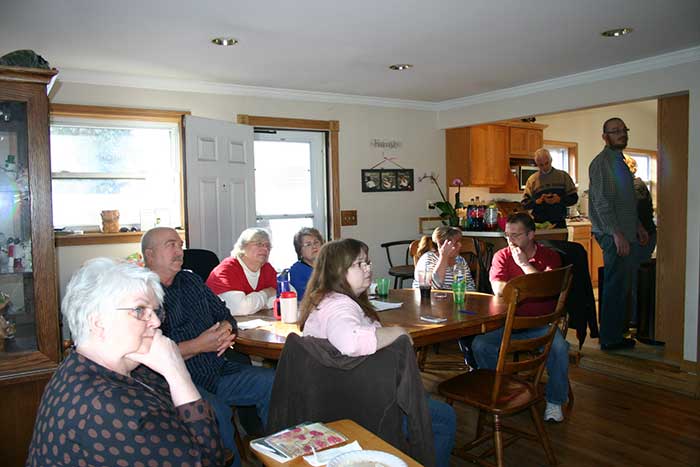What’s a Giant Killer award? At Grace Church, it’s just one of the new ways they’re encouraging and developing leaders in the church.
(Grace Church’s leaders meet once a month a leadership community.)
A leadership community brings new life to Grace Church
The public spaces at Grace Reformed Church in Allen Park, Michigan, are filled with the sort of standard church fare you’d expect—calendars, announcements, and the like—until you get to the bulletin board announcing that month’s “Giant Killer” award winner.
What’s a Giant Killer award?
Pastor Bruce Hunt is glad you asked, because it gives him an opportunity to talk about the Sunday Night Leadership Community, an approach to leadership that is revitalizing Grace Church.
The Leadership Community is a monthly gathering time for all ministry leaders and potential ministry leaders of Grace Church. Hunt intentionally uses the word “leader” broadly—it’s not just the children’s ministry director who’s invited to Leadership Community, for example, but also the two individuals who regularly serve with that ministry. They gather together to share a meal, learn from one another, develop leadership skills, discuss the vision of the church, and pray together.
“When all the leaders of the church come together, we find that it takes care of so many communication issues and calendar issues, and Leadership Community has served us very, very well,” says Hunt. “It promotes community and encourages relationships with all the other ministries that go on—eliminates that sort of ‘silo mentality’ that can sometimes happen in the church.
“I was part of a church prior to Grace that only had a Leadership Community a few times—but each time we had it, it was extremely beneficial. So when I came to Grace, I wanted to start this to unify our leaders around the vision [of the church] and improve on communication. This is starting to be a significant part of the culture…that this is the meeting to be at.”
Attendance at Leadership Community isn’t mandatory, but what is expected is that everyone who comes brings a dish to pass—Hunt believes strongly in breaking bread together. Each meeting includes a training time after dinner, when the group usually reads and discusses a book—the contents of which either focus on ministry leadership or becoming better followers of Christ. After this discussion, there’s time for each ministry team to meet in small groups to touch base, and then the teams come back together for a time of discussion around the vision of Grace Church.
Two things are key to the success of Leadership Community, according to Hunt. First, they always meet in a home—usually Hunt’s.
“We never have this at the church,” he says. “We tried to have this at the church, but I am convinced that meetings at the church just don’t work. We get so much more accomplished in a person’s home—you’re more comfortable, more relaxed…Having this in someone’s home really brings in that sense of community to the leaders.”
Second is that Giant Killer award, where a ministry, person, or group is recognized and celebrated—both at the meeting and on the church bulletin board—for overcoming the biggest ministry obstacle that month. Whether it’s the finance team that made it through a tough budget process or the drama team that successfully recruited new volunteers, the sense of encouragement and celebration is an important part of each meeting. Candidates for the award are nominated by other leaders in the church; Hunt says he, as the pastor, intentionally tries to stay out of it.
“When [ministry peers] nominate someone for the Giant Killer, it builds a sense that other ministry leaders are noticing and recognizing their efforts,” he says. “It’s a lot weightier that way.”
While the format of Grace’s Leadership Community continues to morph, Hunt says the past few years of building leaders has made a tremendous difference in both communication and the way church ministries work together.
“[Leadership Community] builds so much encouragement and a deep sense of unity, because people see what’s happening besides just their own ministry, and that gives us a broader scope of what the church is doing. I know of several people who hate church meetings, but love coming to LC.
“I want them to be passionate about their own ministry, of course, but also be passionate about what’s going on in the whole church.”





